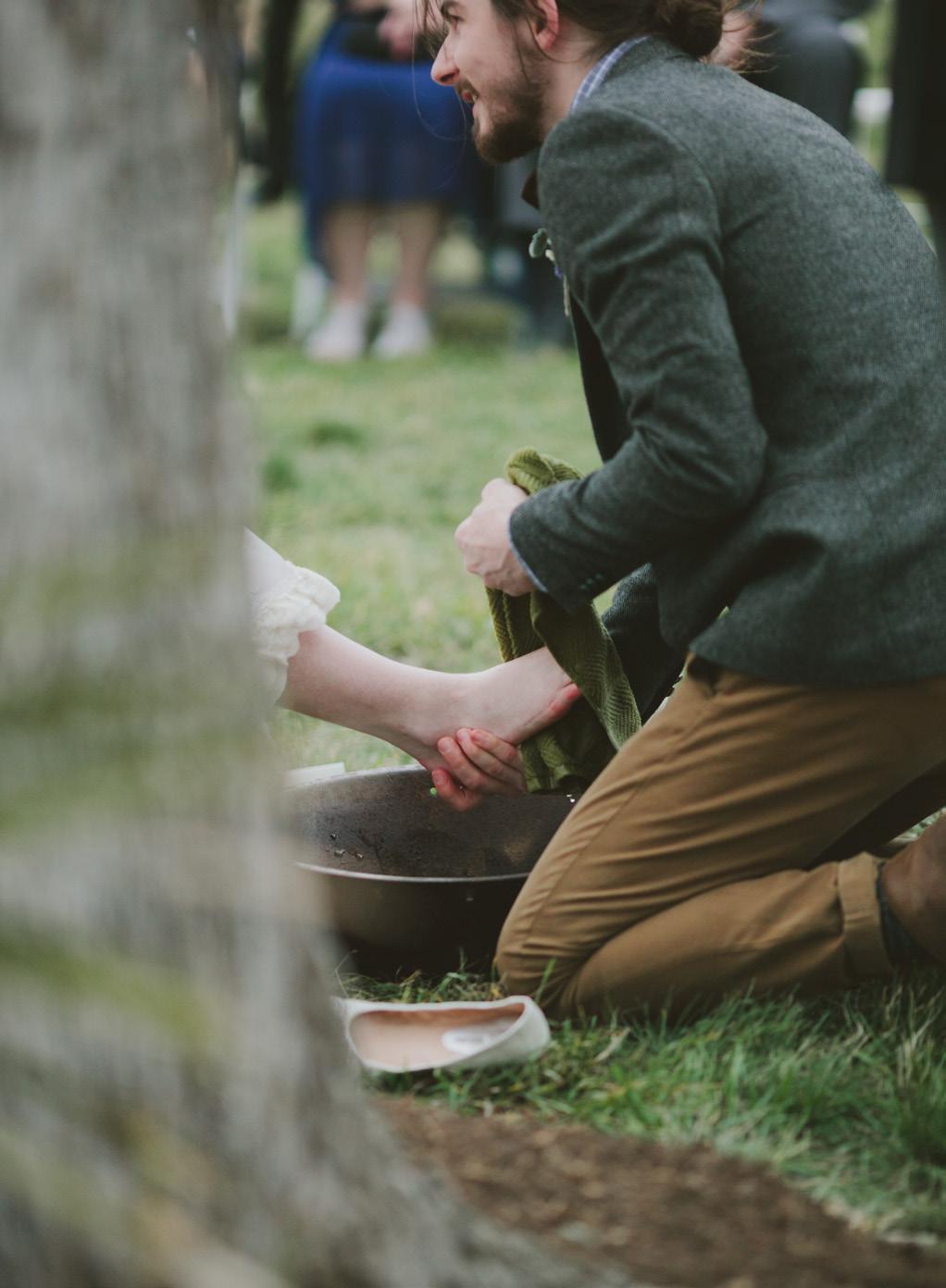
8 minute read
Resolutions and Renaissance
Katherine Baylis
The list-makers love New Year’s. A psychological clean slate of goal-setting and ambitious planning. Even the anti-resolution-making people find themselves poking around for new recipes to try, a new book to read, or perhaps a subscription free trial to indulge in. There’s a sense of anticipation of what could be in the new year that’s exciting, but leave us feeling depleted at the end. It’s like finishing a good book, the kind that you can’t put down, and when you finally finish and are ripped back to reality you feel like something is missing. You know you’re a book person when you’ve missed book characters as much as if they were real people. But there’s something about the tail end of the holiday season that leaves one on an emotional high and a physical low. along with it comes a compulsion to “do better.” The problem is, I find that I’m never more worn out than the first week of January.
I’m exhausted. The anticipation—of Thanksgiving, of Christmas, of a new year with endless possibilities—it’s all exhausting. Completely worth the energy and time we put into the things associated with it, but, draining all the same. It’s strange how the things we look forward to most are the ones that
How is one to map out grand plans for the months to follow when it’s a struggle just to get back into normal routine? I re-entered my work routine with a body that had become accustomed to too much sleep and too much caffeine. I started each day groggy and frustrated. The cynic in me looks at the concept of making New Year’s resolutions as a peerpressured self-betterment which, as someone who deeply dislikes being told what to do, sounds completely odious. There’s also a sense that the new year has to be different in some way, and that there must be change and visible progress towards so-called leveling up as a person. However, rather than resolutions, I think this goal-setting mentality should be rebranded as a renaissance. After all, many resolutions are recycled from the year before, though often slightly modified. Thus, it would seem the new year is more about an attitude of renewed commitment (a rebirth, if you will) to achieving one’s goals rather than a “new year, new me” resolution mentality.
Ambition to achieve one’s goals is an excellent thing, and it is certainly a part of a healthy, growth mindset. But sometimes the importance of the goals overshadows the growth and leaves us feeling like we could have done more. There’s an element of shame in putting a repeat resolution on your list and it can feel exhausting when it makes an appearance a few years in a row. We so badly want to make that change but something always ends up disrupting it. So rather than resolving yet again to do it, I think we could be much kinder to ourselves if we view it as a “rebirth” of the goal. If we leave out our perceived shortcomings from the past, we stand a better chance of truly wiping the slate clean and leaving room for growth.
I’ll admit, it’s the middle of January as I’m writing this and many of my goals have yet to be started. I made a little prayer jar that’s sitting on my bureau with nothing in it yet. I downloaded a meal planning app that is still unused. I bought pens for my new planner and then a case to hold the pens, but I still haven’t gotten in the habit of looking at it regularly. It’s frustrating and amusing at the same time, but I try to remind myself that sometimes change takes time. Reinstituting goals and habits is a process and it’s easy to get discouraged when results don’t happen when or how you want them to. But I think it’s important to take heart in the little victories and not undervalue the calmness of routine.
In the midst of all the planning and goal setting, January tends to speed by and then we’re left in February. I’ve often heard it described as dull, cold and depressing with Valentine’s Day randomly thrown into the middle of it. But there’s a relief in reaching the other side of the New Year’s planning process, whatever it looks like, and actually settling into a routine. It’s comforting to regain stability and feel like you have your feet under you again. The pressure to dream big and plan has dissipated and pragmatism has taken over. In the best cases, the goals have developed into habits and routines by this point, and with it comes the first thrill of success.
If we were to adopt the renaissance mentality to goalsetting, rather than resolutions, it would allow us to recognize that restarting a goal is a slow process and will not yield immediate results. The desire for immediate gratification in our current culture can bring on a lot of discouragement to resolution-ers if progress is not immediately visible. When goals are viewed with a growth mindset, however, February becomes an exciting time where we begin to see the fruits of our labor. Our commitment to getting up early is not only becoming routine, but our body has now adjusted. The desire to spend more time in morning devos has gone through its troubleshooting phase and now is starting to feel normal. The first blush of accomplishment is something to be celebrated and enjoyed, even if it feels like it took too long to get there.

Who Do You Resemble?
Keith Bodger
In February 1991, I visited my relatives in Dundee, Scotland. I left Toronto on a Saturday evening and landed in Scotland on a Sunday morning. My uncle picked me up and we made our way to Dundee. I visited and chatted with aunts, uncles and my granny on Sunday afternoon. On Sunday night, the cousins planned to go to a pub that my cousin Karen’s husband managed. I was visiting for several weeks so I had a lot of cash in my pocket. Like £300 in cash. As we left my cousin’s flat on a dark Sunday evening, I wondered to myself if I should be carrying that much money. Perhaps I should have left some behind in the flat?
We walked up the hill from the flat and towards the pub. My mind was on the cash in my pocket as we walked by an alley. A car came to a screeching halt on the cobblestone street. Two guys jumped out of the car and grabbed me and pushed me into an alley. I thought, This is it. I’m dead and the cash is gone. One guy pushed me against the rock wall and held my hands behind my back while the other kept my two female cousins at bay. The guy who held me started firing questions at me. “What’s your name?”
“Keith Bodger.”
“What are you coming from?”
“My cousin’s flat, down the hill.”
“How long have you been there?”
“An hour or so.”
“Where else have you been?”
“At my Granny’s house. And I just flew in from Canada this morning.” He started to notice my accent.
“You just flew in?”
“Yeah, I landed at Glasgow this morning. I left Toronto yesterday. I’m here to visit my relatives.”
He said, “Where were you born?”
I replied, “Thetford Mines, Quebec.”
He said, “Well, you can’t make that up” and he began to relax a bit.
He then explained that he was with the police, and I resembled someone they were looking for. I think he said there had been break-ins. I said I was with my relatives all day.

At this point my cousin Karen interrupted, “Do you know Roddy McLeod? He’s my husband.” Roddy used to work for the Dundee police.
The officer replied, “Oh aye. How’s Roddy then?”
Karen said, “He’s doing fine. We’re just on our way to see him at the pub.” The police started talking on their radios to update others as to what they were doing and who was being held. They let my hands go and I showed them my passport.
The police were chatting with my cousins and explained more of what was going on. They got a call on the radio that other officers had apprehended the guilty party. We started saying our farewells to the officers when another police car drove by. One officer said, “There’s the guy they got.” There was a guy in the back seat of the cruiser and his hands were clearly cuffed behind his back as he leaned forward. The streetlights illuminated the back seat enough for us to see how he looked. He was Caucasian like me, but he had a full head of jet-black curly hair. He was wearing a black leather jacket. I was blond and clearly on my way to going bald (where I’ve long since arrived). Light wispy hair would be a good description of me, certainly not thick, black and curly. I looked nothing at all like the guy in the car. I didn’t own anything black, plus I was wearing a dress shirt. We questioned the police about their ability to identify their culprits and they kind of shrugged and went on their way. So did we.
Have you ever been mistaken for Jesus? Not in physical appearance but in temperament, action, love, grace and compassion? Have you ever met someone and thought, “They would make a good Christian.” I have a friend in Canada that we said about, “If Jesus wore flannel plaid, he’d be just like Mark.” That was a compliment. I was at a Bible study years ago and met someone from work who I knew more by reputation than interaction with him. I was excited to see him and exclaimed, “I didn’t know you were a Christian.” He laughed a bit but, in hindsight, that was not a complimentary statement. Oops.
As we read and study the Bible, we are to become more like Christ. There are numerous Scriptures that speak to this. The ones that hit me the hardest are:
Ephesians 4:15 – Rather, speaking the truth in love, we are to grow up in every way into him who is the head, into Christ.

1 John 2:6 – Whoever abides in him ought to walk in the same way in which he walked.
Ephesians 3:17-19 – So that Christ may dwell in your hearts through faith—that you, being rooted and grounded in love, may have strength to comprehend with all the saints what is the breadth and length and height and depth, and to know the love of Christ that surpasses knowledge, that you may be filled with all the fullness of God.
And if this discourages you a little, as it does me, we have this hope in Philippians 1:6, “And I am sure of this, that he who began a good work in you will bring it to completion at the day of Jesus Christ.”
God wants us to be like his Son, Jesus Christ. It’s a strange irony, though. The closer we become like Jesus, the further away we realize we are. Regardless, we keep moving in that direction, knowing that we can be more like Jesus as we keep reading Scripture, keep confessing our sins to God, and keep praying that he will change us to be more like Christ.
In the meantime, I’m also going to keep praying for thick, black, curly hair.
Communion At College Church
FEBRUARY 5











